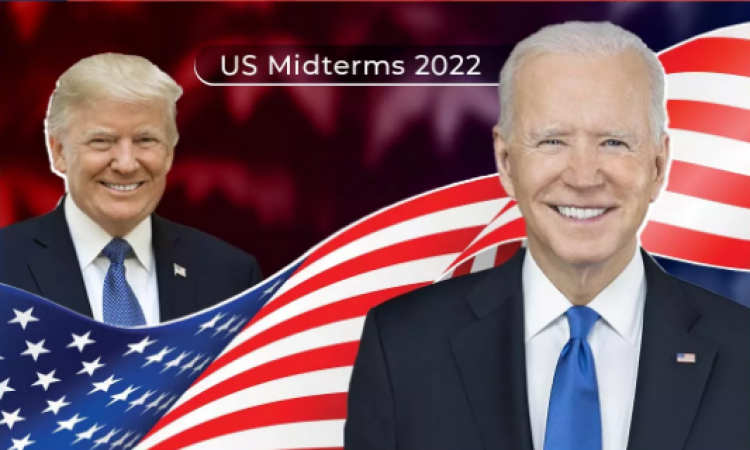
USA: Particularly in crucial battlegrounds like Nevada's 3rd Congressional District, one of the most expensive congressional races in the nation, Asian-American communities have emerged as a crucial constituency for both Republicans and Democrats.
In five states, including Nevada, which has sizable Filipino and Chinese-American populations, Asian-Americans make up more than 10% of the total population. They are the fastest growing racial or ethnic group in the country.
There are about 350,000 Asian Americans in the state who are of voting age. Joe Biden won the 2020 presidential election by about 34,000 votes.
Also Read: French MP hang down for calling a black colleague "back to Africa"
In the largest AAPI neighbourhoods in the region, west and southwest of the Las Vegas Strip, both parties are evaluating how well their campaign messaging on crime, inflation, and abortion resonant with AAPI voters.
More than any other district in the country, the Republican Congressional Leadership Fund has spent US$10.9 million on campaigning in the Las Vegas area. According to information compiled by California Target Book, which monitors federal campaign finance filings, the Democrats' House Majority PAC has spent $3.4 million.
Susie Lee, a Democrat from Nevada, spent an afternoon this week visiting the Chinatown Plaza in Las Vegas to speak with business owners about how she and other members of her party have worked to make sure they have the resources to withstand rising costs and the economic damage the pandemic caused.
The second-term incumbent claimed that the Asian-American community in her district has always been a priority, but Lee's last-ditch effort comes amid unprecedented Republican efforts in Nevada, including those of her rival, April Becker, to target Asian-American voters with the party's economy-focused message.
I keep telling people that yes, inflation does affect us all and that it hurts us at the grocery store and at the gas station. Lee noted that Asian-American business owners frequently thank her for supporting economic relief during the pandemic.
"But there's one party that has taken action to take on inflation and there's one party that wants to use it as a talking point," she said.
When the state's political boundaries were redrawn last year without the support of the Republican Party, the Democratic-controlled Legislature gave priority to bringing the Asian-American community together into the 3rd District.
Asian Americans now make up 21% of the population who are of voting age. The district now appears to lean more blue than it did before, but the new boundaries may prove to be a mistake.
Republicans are working to expand their inroads in areas like southwest Las Vegas, where the Republican National Committee opened a "Asian Pacific American Community Centre" to serve as the hub of their outreach efforts six months ago, after Asian-Americans performed better than expected for them in the 2020 election.
Also Read: CCP: Unification is the only alternative for Taiwan
They claim that Republicans are publishing campaign materials in more languages than ever before, including Chinese, Hindi, Korean, and Vietnamese, and are advertising in local publications like the Asian Journal of Las Vegas and the Philippine Times of South Nevada, where RNC Chairwoman Ronna McDaniel published an opinion piece last month titled "Filipino-Americans Strengthen Our Country. Democrats Don't."
Democrats have long used similar outreach strategies to encourage voting in Asian-American communities. The Democratic Congressional Campaign Committee is running ads in Tagalog and other languages to contrast Lee and Becker in Nevada this election season that focus on abortion and hate crimes.
They are running advertisements in the same neighbourhood publications that Republicans do, as well as in the twice-monthly Korea Times Las Vegas and on the Filipino radio station PHLV.
Although Asian-Americans have historically tended to vote Democratic, the Republican Party, also known as the GOP or the "Grand Old Party" in the US, hopes to reduce the gap.
The GOP will gain more votes while Democrats continue to lose Asian voters; it won't be about winning the AAPI vote outright. They will determine who wins in close races, whether they are in Nevada, Texas, Arizona, or Georgia, according to Nainoa Johsens, the RNC's director of AAPI outreach.
He continued, "We've made progress in areas where people historically didn't think the GOP would." Republicans have claimed that their emphasis on public safety this year will resonate in Asian-American communities amid a wave of anti-Asian hate crimes.
The experience of Asian-American students in college admissions, which is at the centre of a prominent affirmative action case before the US Supreme Court, is another factor they hope will boost turnout.
Both parties have contacted voters more frequently than in prior elections, according to Janelle Wong, a University of Maryland professor and co-director of the research organisation AAPI Data.
Although linguistically, economically, and politically diverse, survey results show that Asian Americans and Pacific Islanders are relatively united on a number of issues, including support for access to reproductive healthcare, when compared to other demographics.
Also Read: Demands for funding and geopolitical issues will rule the COP27 climate talks
Despite the fact that since Roe v. Wade was overturned, Democrats have made abortion a central issue in their midterm campaigns, Republicans' efforts could be crucial in races that come down to a few thousand voters if they can inspire voters with issues like crime or a weak economy.
If the past is any indication, they might succeed in their goal of weakening the Democratic bloc, according to Wong.